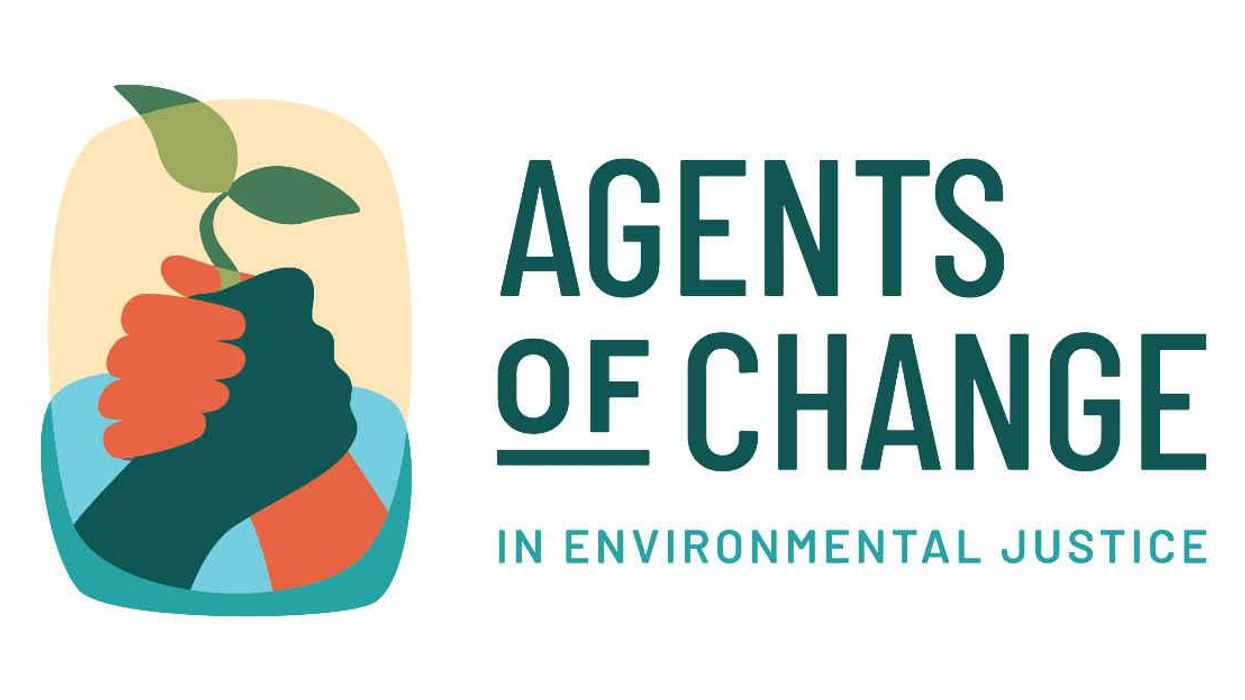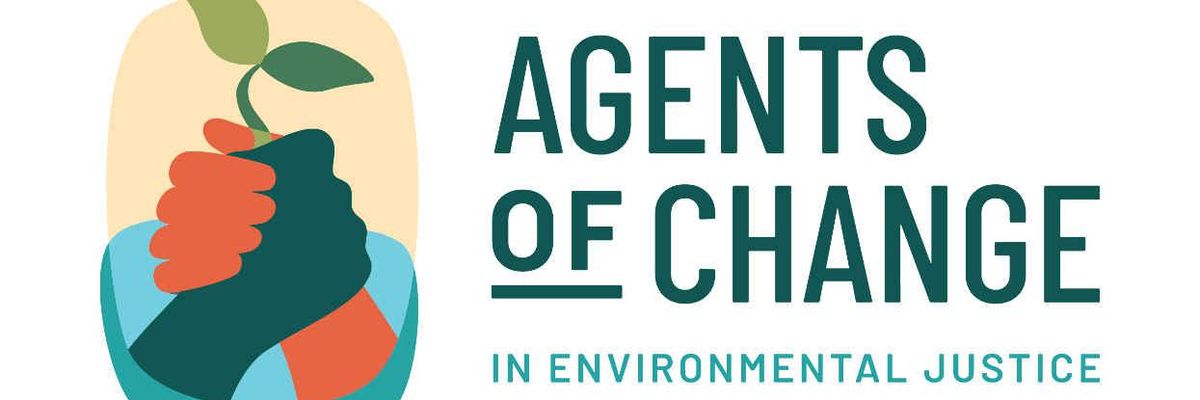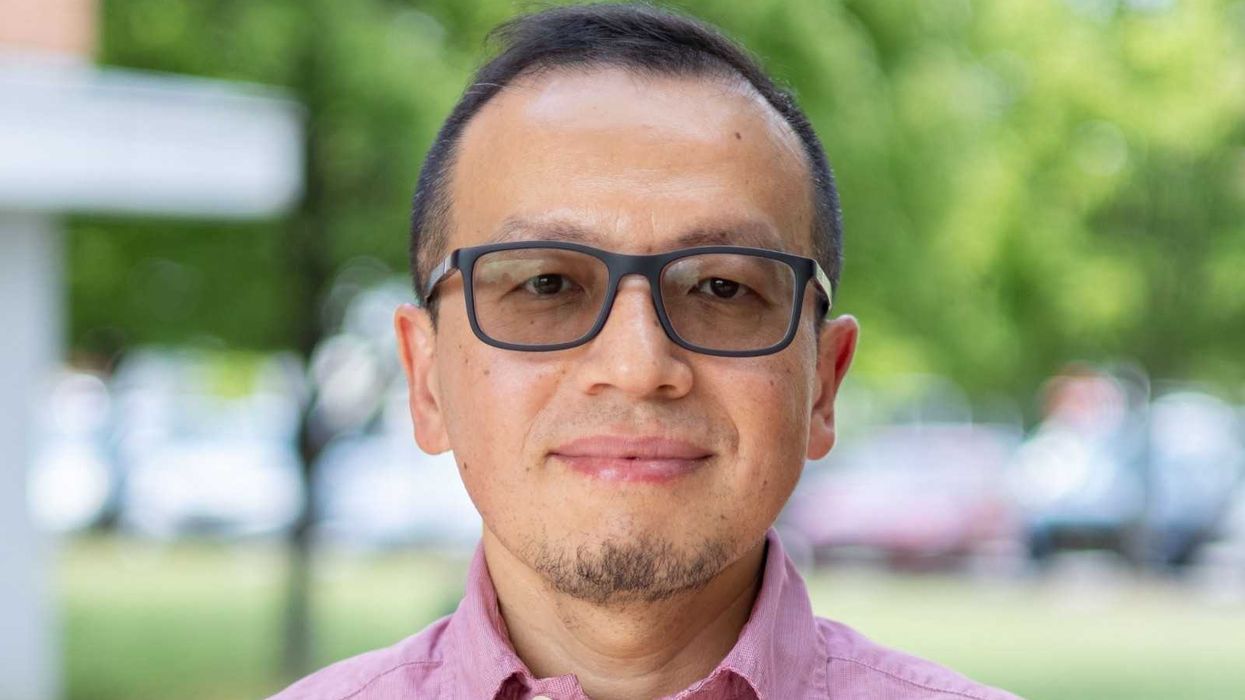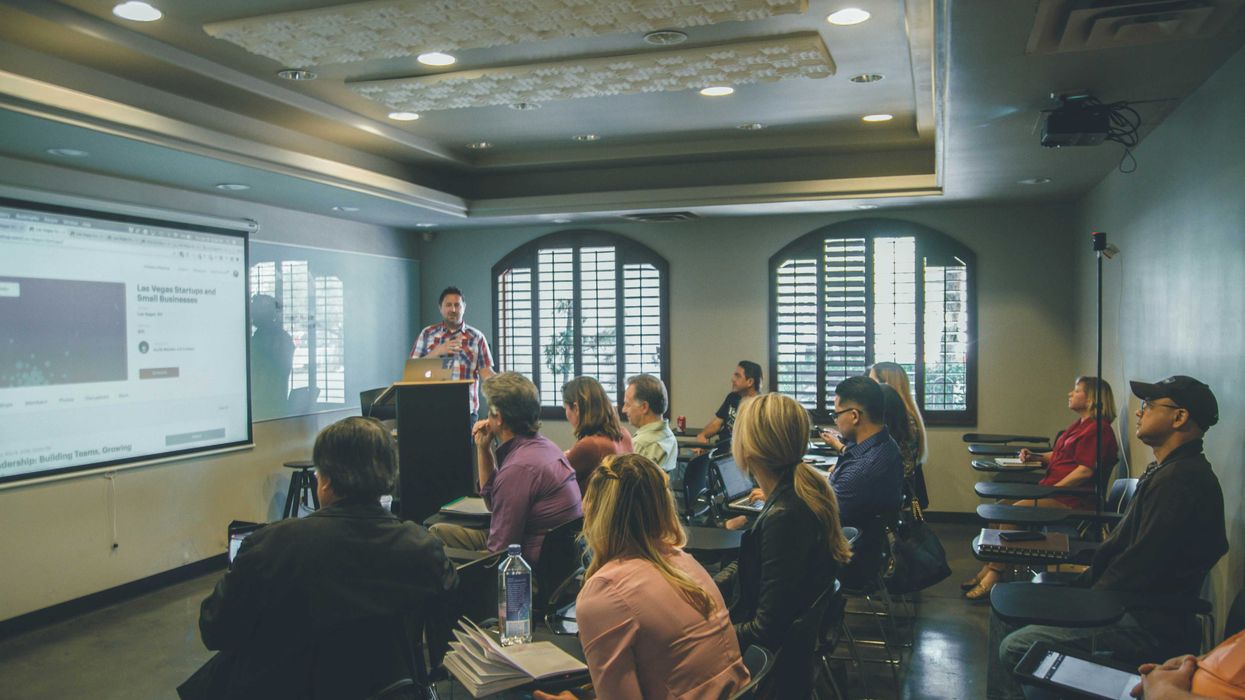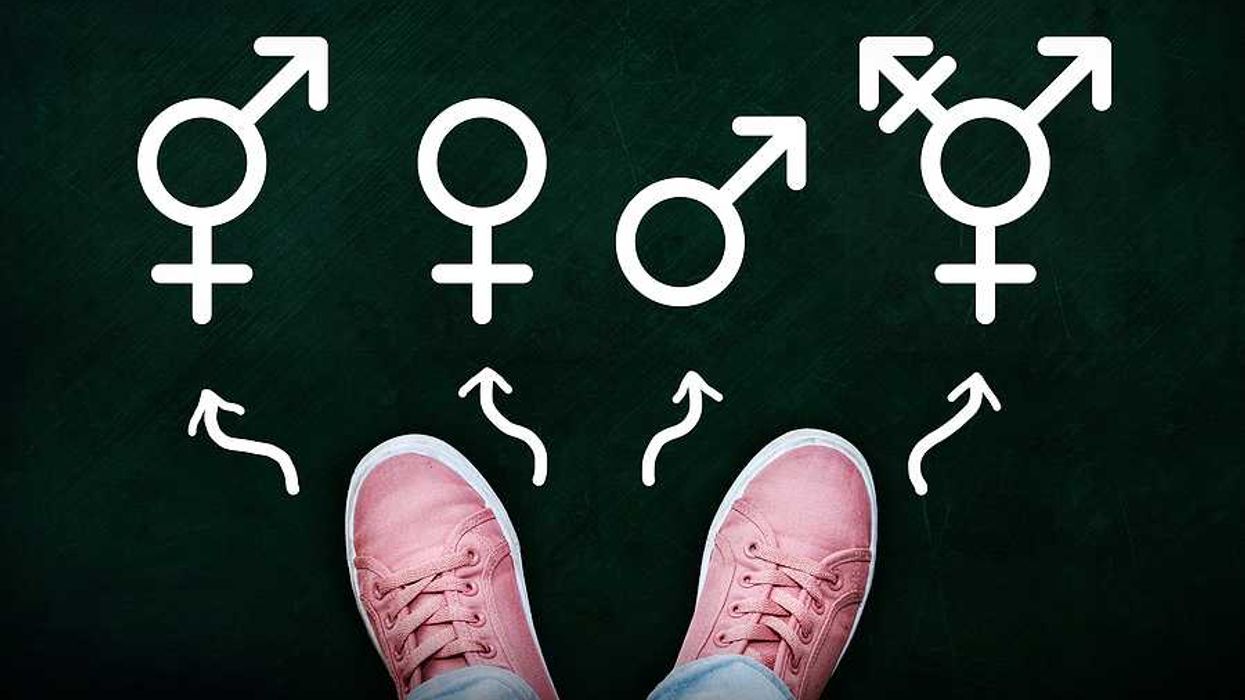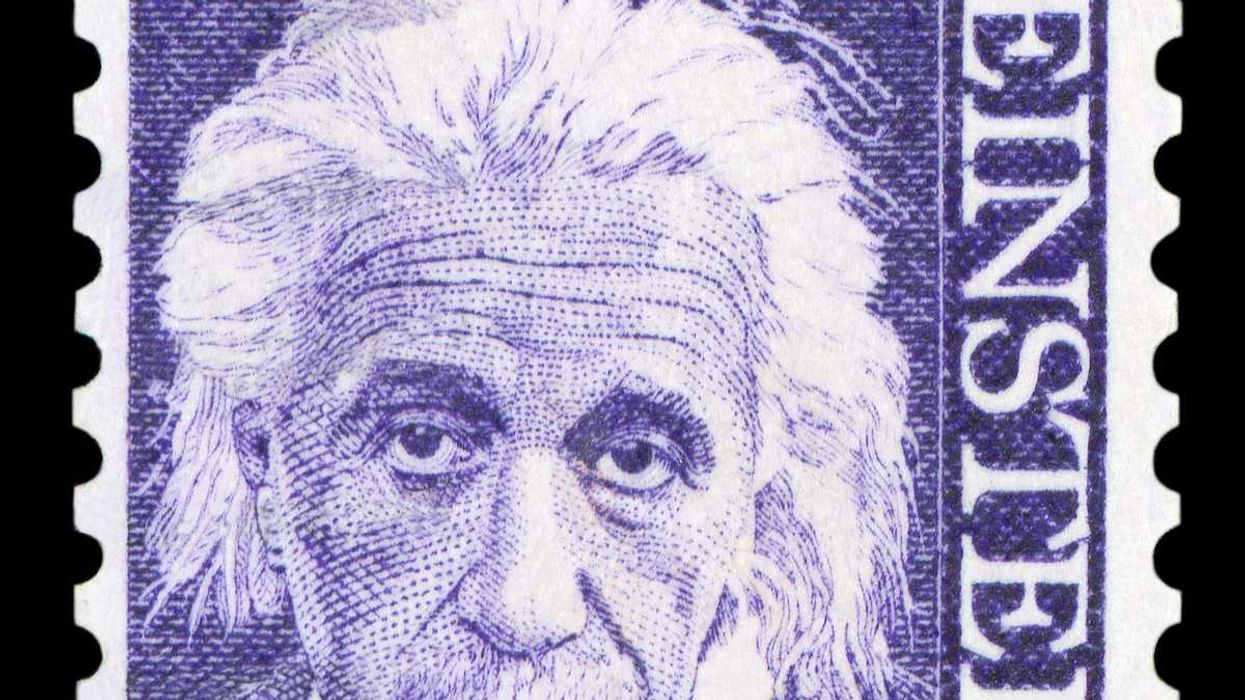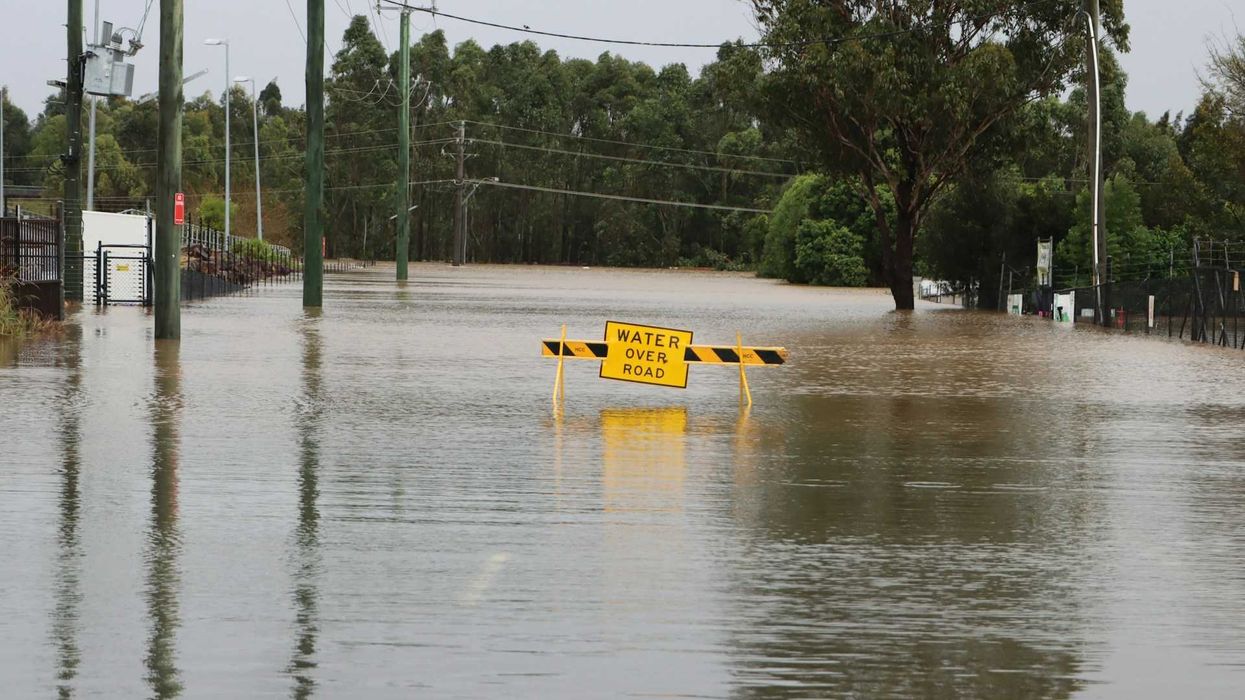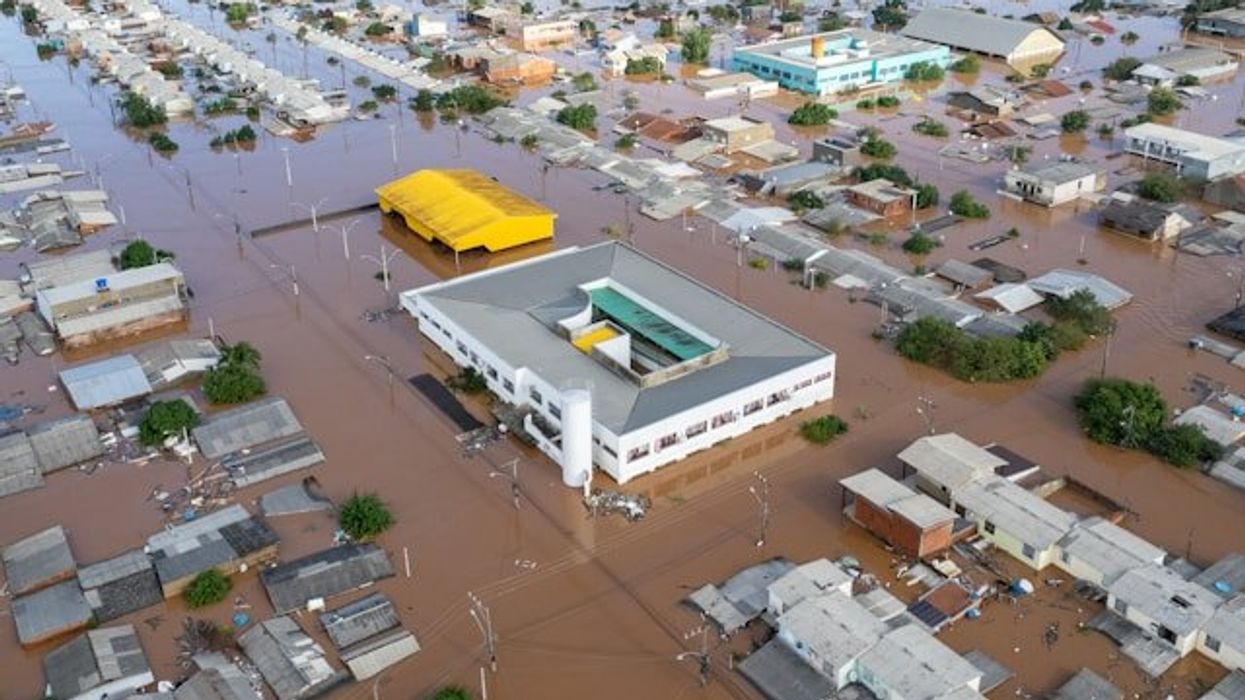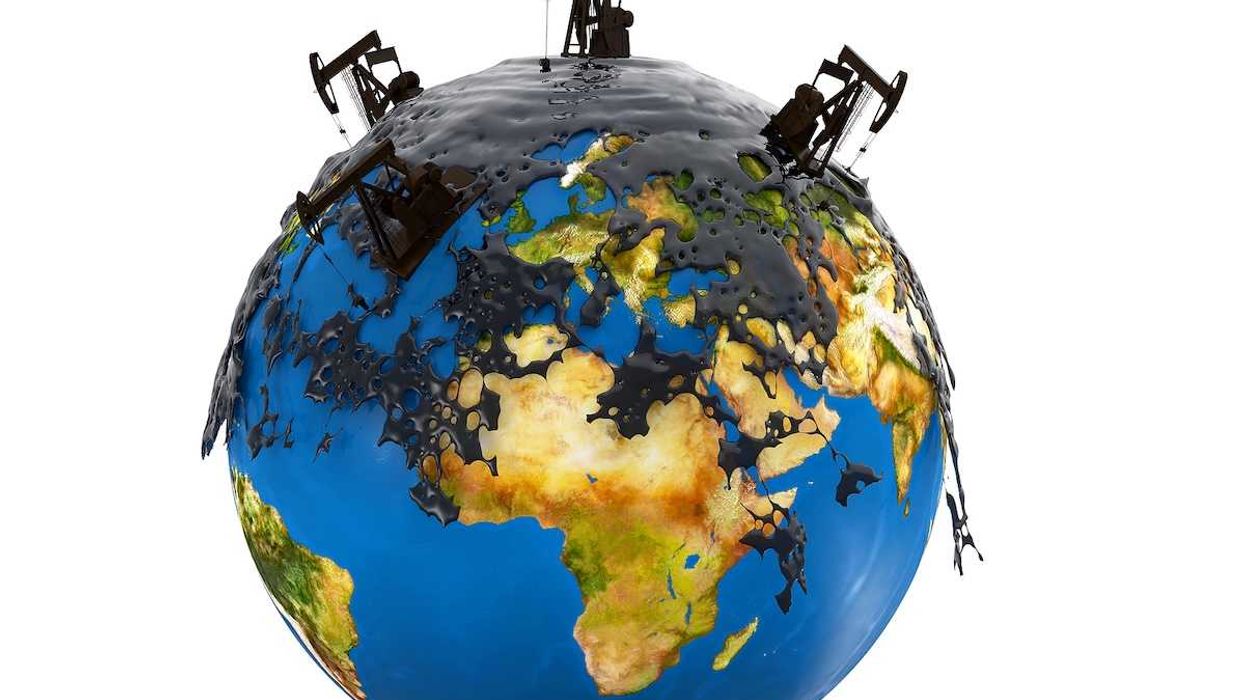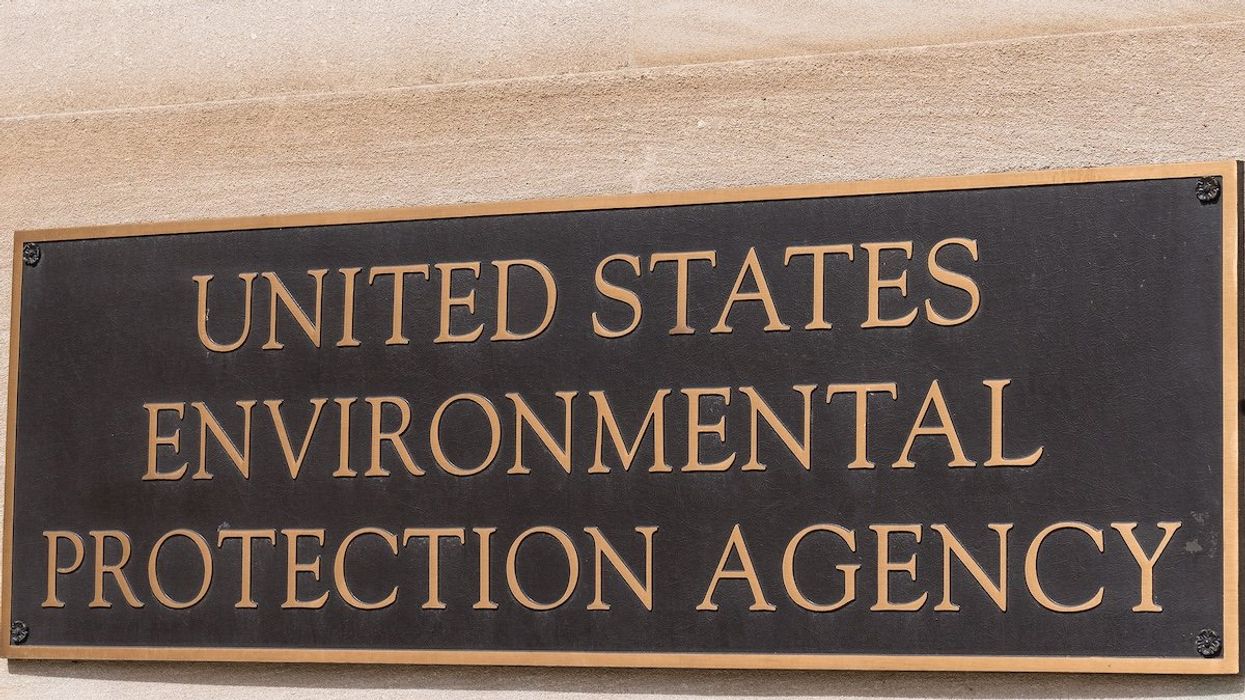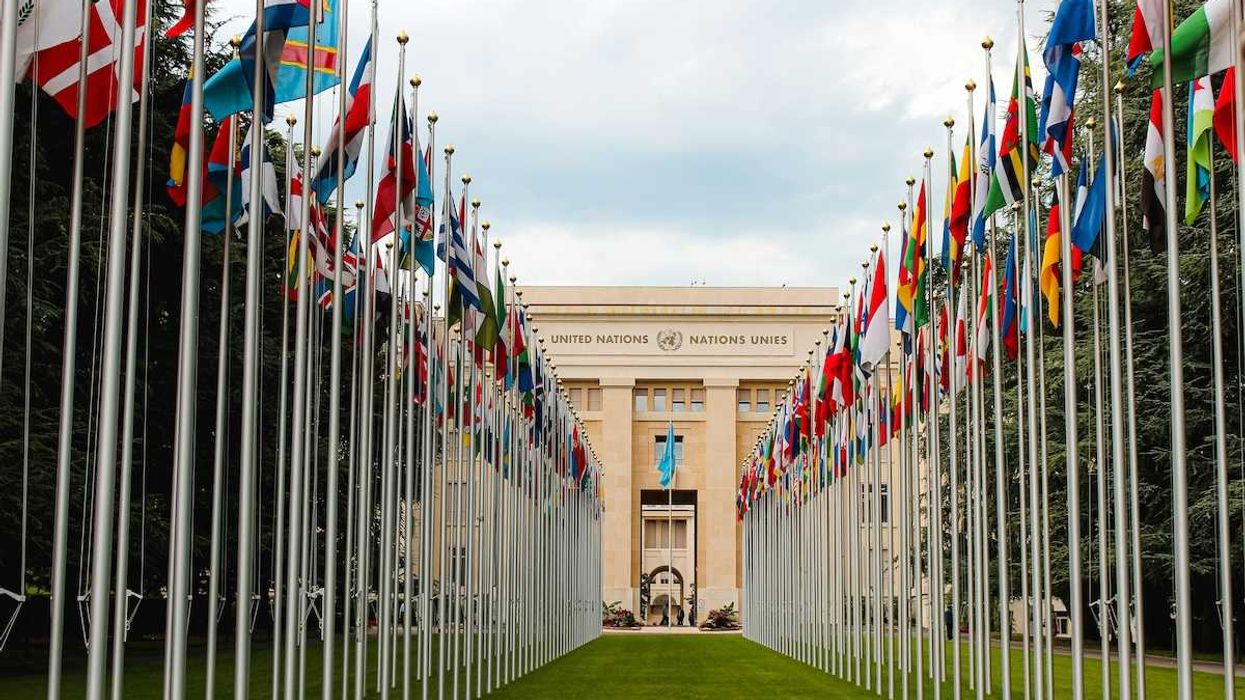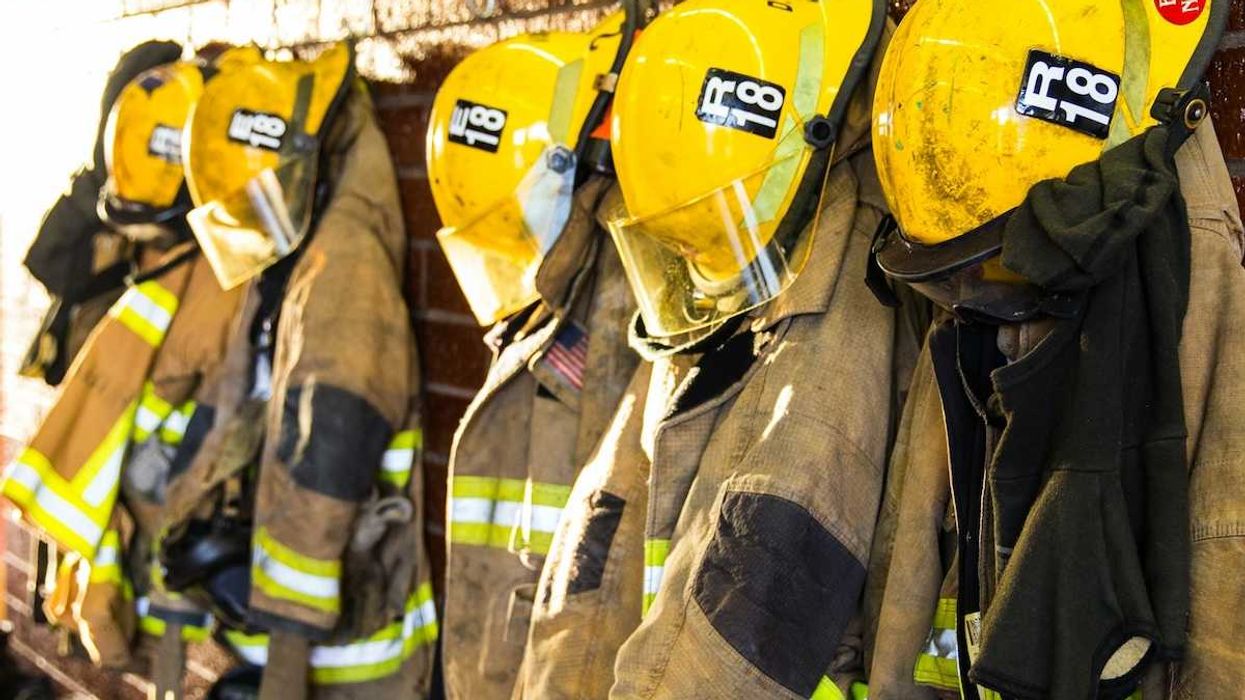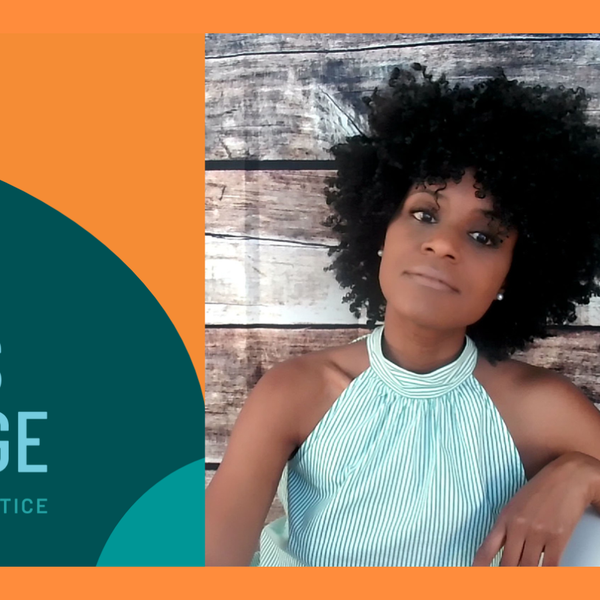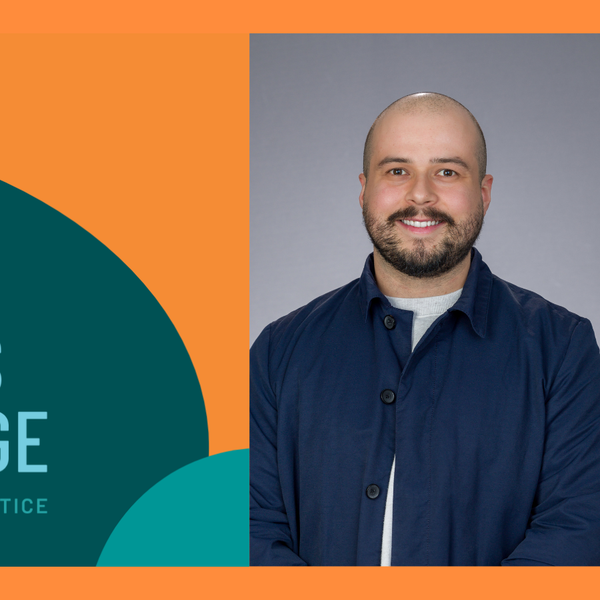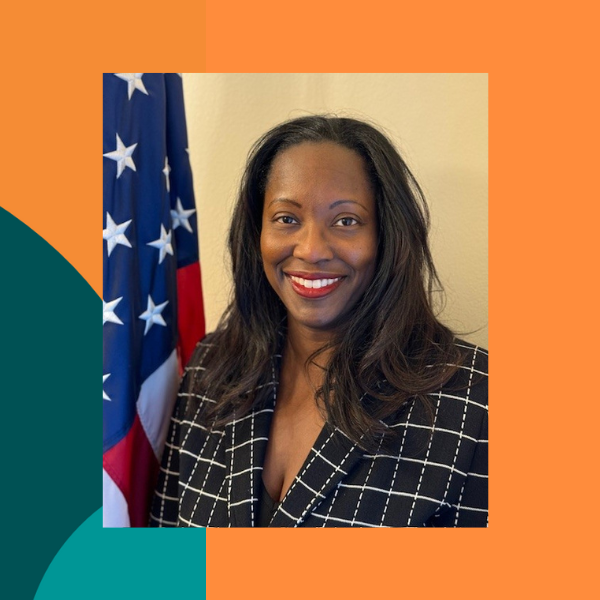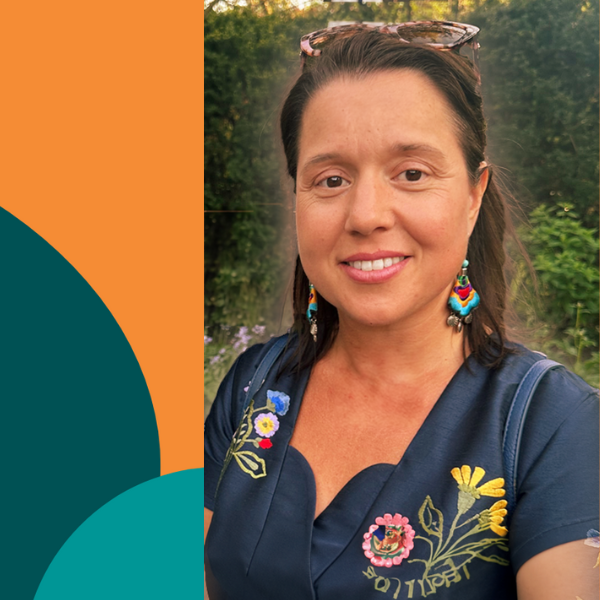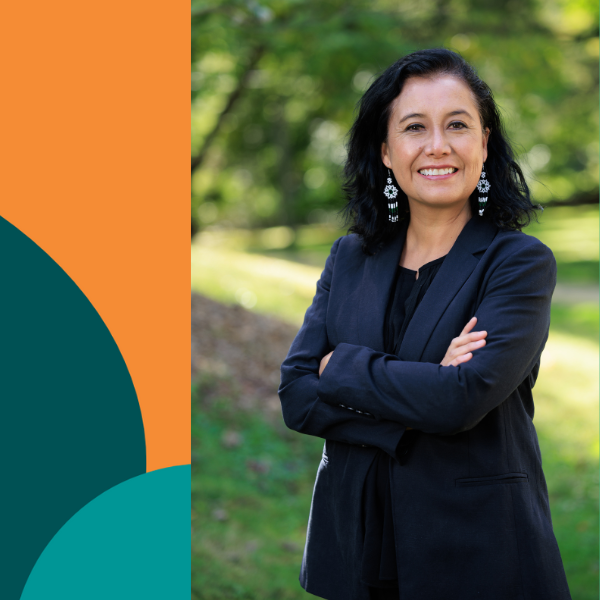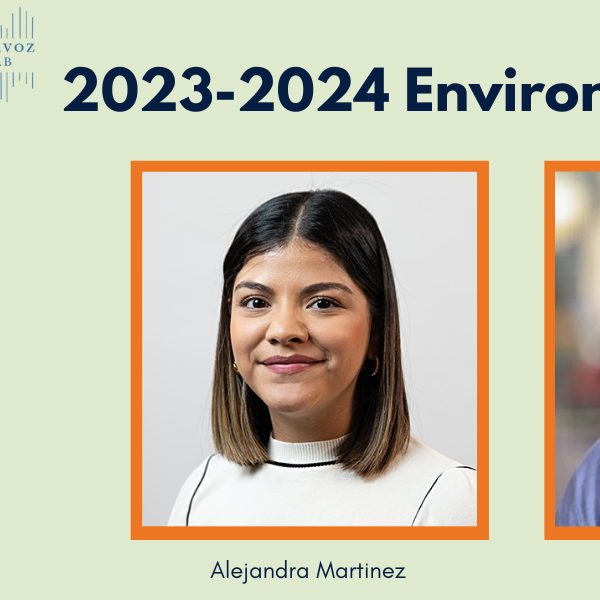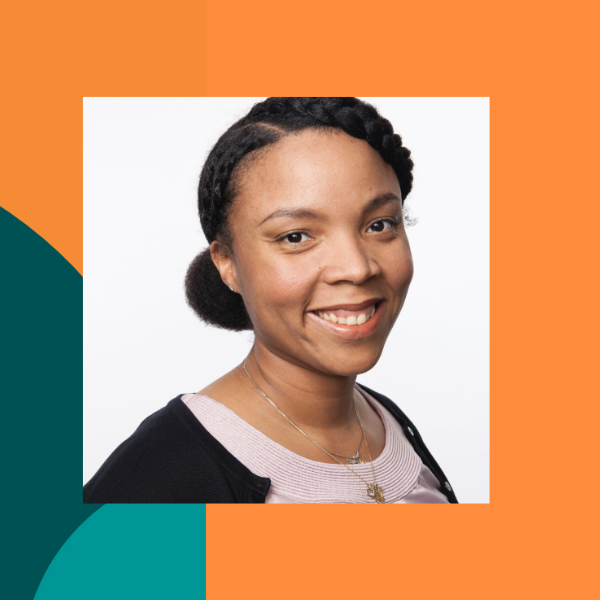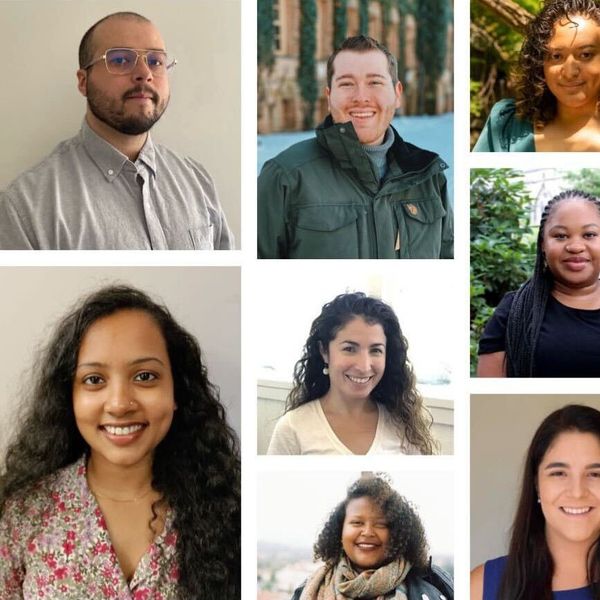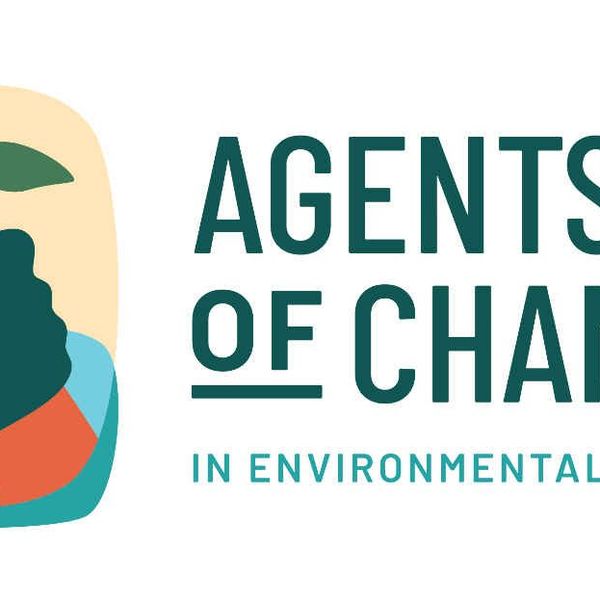OreOluwa Badaki joins the Agents of Change in Environmental Justice podcast to discuss her work as an educator around the world, and the importance of "cultural ways of knowing and being."
Badaki, a Ph.D. candidate at the University of Pennsylvania Graduate School of Education, is part of the current group of Agents of Change fellows. She talks about working with youth of color on food justice, getting in touch with her Nigerian roots, and the role movement and dance play in her life.
"I take heed from a lot of feminist scholars and Indigenous scholars and others who remind us that we are not just our intellect, we are our bodies, we are spirits, we are feelings," she said. "There are other important faculties to consider when we're thinking about the rigor of our work."
The Agents of Change in Environmental Justice podcast is a biweekly podcast featuring the stories and big ideas from past and present fellows. You can see all of the past episodes here.
Listen below to our discussion with Badaki, and subscribe to the podcast at iTunes, Spotify, or Stitcher.
Transcript
Brian Bienkowski
How are you doing today?
OreOluwa Badaki
I'm doing well thank you I'm grateful for a new year, hopeful for more optimistic beginnings, but also very prepared trying to be prepared for whatever 2021 brings.
Brian Bienkowski
Yeah, I think we've all learned to not expect too much I was hearing, listening to some NPR predictions from last year about 2020 and I think everybody was way off, so. Right. Well, our I'm really happy to have you here today your story is fascinating and I wanted to start with. So I know your family emigrated to the US when you were very young from Nigeria, and I was wondering if you can tell me a little bit about this move in any aspects of your upbringing that made you want to become an educator.
OreOluwa Badaki
Yeah, thank you for that question. Yeah, you're correct we emigrated to the US when I was three. There was sort of a lot of political and social unrest in Nigeria at the time that had just been another attempted coup. So, my parents were seeking more stability and safety, and you know better opportunities education opportunities for my siblings and I and so I knew that I think that's like the first thought I had about why I was in this country was because of education. So I sort of grew up with an appreciation of education but also I think an appreciation for educators. My mom always wanted to be a teacher and was like, secretly actually not so secretly hoping that one of her kids would end up being in education so I'm making them proud. And my dad. He's not currently an educator, but his first job out of university was teaching, Nigeria has a National Youth Service Corps which is sort of like a mandated mandated American AmeriCorps and so because you know you started sort of a year out of college doing something to help develop the country and my dad was stationed in high school in Bendel state, where he taught English and literature, and my journey sort of picks up where he left off and then works backwards. So my dad went on to have a career in international development which is what I wanted to do in university I wanted to work with the UN and sort of work on more global sort of macro level Policy and Planning. But the more I learned about social issues like food security climate change racial justice health inequities. I think the more I became convinced that the only, or at least a main proactive and sustainable solution was education, because people and systems, can't change unless they know how to listen and learn how to so this is clearly not revolutionary but it was an important enough I think to my 20 year old self and sort of sparked a desire to understand and learn more about the art and science of teaching. And I think I was also struck at the time, even when I was just sort of ruminating and considering this next step I was struck by what I perceived as a lack of value in educators. Like I said, I came from a family that value, educators, so that wasn't an issue but it was more sort of colleagues or even distant relatives when I said that this is what I wanted to do after graduation I was met with the sort of like oh really you like did all this work and got this degree, just so you could teach. And I later learned in my subsequent master's degrees that this is not by accident and that sort of at least in this country a seemingly innocuous movement towards accountability and sterilization in public education, somewhat prompted by like a real obsession with education economics in the 70s sort of helped to create a culture that although recognize the importance and impact of teachers and addressing social issues in a way to replace the bulk of the burden on them for fixing all the issues and simultaneously like stripping them of resources and blaming them for failures in the public education system. So I mean, certain books like Elizabeth greens building a better teacher and Dena Goldstein's teacher wars, helped me sort of unpack these experiences and see the profession from a wider system's level analysis rather than sort of pathologizing or pathologizing perspective that localize the problems within individual teachers so anyway, I ended up teaching after college was able to integrate. My interest in international development, because I ended up being able to teach in different parts of the world and eventually did get the chance to work with UN on education policy. And that's sort of how I found myself here.
Brian Bienkowski
I'm glad you mentioned the books because I was gonna ask you about that it's always fascinated me too. And, and saddened me to think about how we, we don't treat teachers in this country, as pillars of society I mean these are the people that we send our children to go and learn about our world from, and I'm definitely gonna check out those books. And I know as an educator you've, you've worked in a lot of different communities around the world too and I'm wondering if you can talk a little bit about some of those places and experiences and how health and environmental sustainability have kind of remained a common thread in a lot of the work that you've been doing.
OreOluwa Badaki
Great. Yeah, thank you. Um, so my first foray into teaching, which was not very successful. But I did my best. But, you know, it is a challenge. It's a really really hard thing to do, but I was teaching in South Africa and in Khayelitsha, which is a township outside of Cape Town. I was teaching sort of literacy just sort of more like supplemental courses I wasn't teaching core courses, thankfully, but I was teaching literacy I was teaching civic engagements. And then sort of went to get more official training and taught, middle school language arts on the Navajo Reservation in New Mexico. And while I was teaching there over the summer as I was teaching in Ghana, because I had sort of forged a connection with the school in Kumasi, while I was in college I was at university and so I wanted to continue that connection and I sort of, I was trying to build a cross cultural like civic engagement project, slash program between my students and Navajo my students in Ghana. And then after that I went to work with UNESCO on policy and programming initiatives that were focusing on youth engagement within the cultural and creative industries in Samoa. And while there I was just volunteering with different youth groups. And then right before starting my doctorate I worked on a UN Commission report on financing. Sustainable Development Goal number four, which is about ensuring inclusive and quality education.
Brian Bienkowski
I'm wondering you know as a reporter who's who's done a lot of reporting on environmental injustice. One of the things that I find really important is before I go into community to have done my homework, to not go in there with any assumptions and being respectful enough to know the history. I'm wondering when you're bouncing around, and maybe it wasn't bouncing but you know there was some, there was some time in between how much homework for you goes into understanding the cultural differences between, say the Navajo reservation and places in South Africa.
OreOluwa Badaki
Yeah, thank you. Um, all of my expectations, sort of came from a place of, well actually just having no expectations and more of thinking about what I could do that would be of service, and you can't really be observers unless you know what is already happening and what's going on. And so, I like my training for teaching in the Navajo reservation was really rooted in something called cultural responsive teaching or an education, sometimes called culturally sustaining pedagogy, but really, again, in recognizing that public education has been a tool that has erased, so many different ways of knowing ways of being that it also needs to be a tool and sort of rectifying that. And so I had a wide array of experiences with different populations, but also because I had specific. Yeah I had specific intentions of purely listening I think that's what drew me to research that's what drew me to want to do this work is because that's your job. That should be your job as a researcher is to listen and do qualitative research I do ethnographic research and so I've always liked hope. Anyway, you'd have to go and talk to the people I've worked with, to make sure that I actually did this, but I put a high. I put a lot of value on listening. So yeah, I mean in these contexts. I realized I didn't answer the second part of the question which is, how does that. How does sort of environmental and community health tie into all of these different experiences. So, I was teaching. In addition to teaching sort of in formal settings I was teaching a non formal settings community settings and at the core of that work was civic engagement. At the core of all of my pedagogy and curriculum. So students were using what they were learning in the classroom to design and implement community engagement projects. And many of the communities where these students were from suffered from deep health and environmental justice issues colonialism industrialism capitalism, you name it, and the issue students tend to want to address with their projects were at the intersection of public and environmental health and the reason that I introduced these into curriculum curriculum, originally was because I asked, you know, students like what what do you want to do. What do you care about. And sort of these were the issues that emerged. And so students end up doing projects around, pollution, diabetes in their community, drug and alcohol abuse degradation of the built and natural environment. So these are some of the topics that they ended up addressing. And it's interesting because I'm not environmental health. I'm not environmental science teacher I'm not a health teacher. But you sort of realize how interdisciplinary these issues are. I found that, especially when I was teaching in indigenous settings there's less of a compartmentalization of minutes in all digital settings settings specifically was working on the Navajo reservation, there was less of a compartmentalization of different ways of knowing and being so I taught the US public school but it was on Navajo territory and that was as a sovereign nation and so we were also encouraged to at the same time we were using. You know, National Education Policy standards. Common Core was big, at the time, you're also using standards from the Navajo Nation Department of Education, and as the term that Navajo people used to refer to themselves, and they have had standards on sort of culture and how to develop cultural and cultural understandings and character, cultural and character understandings. And so at the same time I was teaching Common Core standards like, you know, identify main idea and support idea with evidence. But I was also bringing in standards or. Yeah, I was also bringing standards from the Department of Education, which were around investigating. Different preparations of plants or understanding how to fundamentally live in harmony with your environment and sort of trying to merge those two different ways of knowing, but still prepare my students for the assessments that they needed to take, because that was my job, but also make sure that there was, it was my teaching is being guided by something a little bit more relevant and responsive to what I was hearing from them. So yeah.
Brian Bienkowski
Before we talk more about your work. You talked about this, I don't know if it was a moment, but when you were thinking about working at the UN and kind of the, these, these larger systems, and then you decided that an educator was your path. I'm wondering if my question is, what was the defining moment that shaped your identity and I don't know if that was it or if there's something else.
OreOluwa Badaki
Yeah, thank you. Um, I think. I guess one. The first thing that comes to mind is while I was teaching sort of recognizing that there doesn't have to be that big of a gap between sort of what I was doing in the classroom, and what might be happening, you know, and UN headquarters in Paris, a home and. And it was sort of an I think that's why as a university based researcher now as educated now like being able to bridge those worlds. That's something I'm really interested in, but I think a moment and I was teaching where I was like okay I feel like I still want to make sure like if I'm entering into a space, if I'm entering to a policy space, I'm entering to an academic space like what is, what am I bringing to the table, and I and part of reason I wanted to teach is because I felt like I wanted to skill set like something rooted in practice that made it so that anything I was saying about sort of wider decisions that were being made about people's lives was rooted in. In, sort of my experience with actual people, and I had faces in mind, names in mind. And so I think I feel like the moment. I don't think I don't sort of claim to be any sort of like gifted or masterful teacher, I just I really like it. But I think one, one moment where I really felt like I was in my zone, was one of my classes, when my seventh grade classes had decided that they wanted to write a play, they wanted to write a play, and they wanted it to be bilingual, they wanted it to be Navajo and English. And clearly, I do not speak Navajo and I have no right to teach Navajo, but we did have a Navajo language teacher at the school. We did have obviously this wealth of resources and students parents in their, in their grandparents. And so, in and of itself and we had to sort of open up our classroom to knowledge bases that like I didn't have and. And we needed. And it was just really wonderful sort of seeing different personalities emerge some kids were like, all about script writing some kids were all about acting some kids were all about stage directing publicity like really being able to activate these different skill sets that were dormant in, in, in some ways, at least in my classroom up until that moment, it didn't come without struggle I there I actually did receive pushback from some parents who didn't want, sort of, students thinking about or working with a Navajo language in my class because I was an English language arts teacher, and some of the parents and some of the grandparents of my students were. Unfortunately, part of sort of the native boarding school system in this country and for those who don't know is sort of a really. Yeah, really, really dark moment. One of many, in which sort of US public education forcibly removed. Many children, Native children from their families and forced them into boarding schools were the sole objective was to remove and erase their, their culture and their identity and sort of assimilate into American Western ideologies. And so in a lot of, not a lot but some people were coming from that background and so they didn't understand why in an English language arts classroom, they would be trying to integrate Navajo when I had to have some difficult conversations around you know the difference between subtractive bilingual education and additive it doesn't, it's not a zero sum game, and sort of rigorous rigorous teaching in both languages can actually facilitate better proficiency in both. If done well. And so I mean we had different issues. Along the way, but I really at the end of the day feel like, Okay, this was a collaborative project this was a creative project this was a project about citizenship. And now as I'm researching more and sort of working with different stakeholders in policy and academia, in community based settings. Those are three things that I think really connect what I want to do and what I hope to continue doing
Brian Bienkowski
That's great that I live, I live near two Anishinaabe tribes up in Michigan's Upper Peninsula. One thing I've learned is how central languages to culture, and perhaps that sounds naive to someone like us probably thought about this a lot more but having grown up in a city, and then moved up here near the reservation it. It is one thing that I've noticed and your story kind of struck at that. And, you know, part of your work has centered on youth of color and thinking about them as future leaders, and given the unprecedented attention this past year on people like Greta Thunberg and other young climate activists. How do you feel the media portrayal and overall coverage of this movement has been and what are, what do you think people are missing or not thinking about when we talk about youth activists and leaders.
OreOluwa Badaki
Yeah, I mean I'm definitely a big proponent of the power of young people and the need to uplift their voices. I just I think that they're. I think that what I've learned through my work, thus far as well as what I've learned through my work with my advisors who. One of my advisors has written advisors has written extensively about sort of the need to think about intergenerational learning, when we're thinking about literacy or language development, because young people are part of ecosystems they're part of families and part of communities that don't sort of disappear when they are giving a speech at the UN, or when they are coming into a classroom. And so I think the excitement around, young people is warranted youth are at the heart of so many social movements in the 60s at the heart of civil rights movement in this country but also in sort of the fight for independence. In many countries in West Africa also in the 50s and 60s. Now they're at the heart of, you know, gun control movements, police reform racial justice and of course climate change. So I think the excitement is warranted I just I think that, you know, recognizing that it's not always helpful to sort of pin all of our hopes on these children, and also remove them from the context from which they come, so I work with young people who are working towards for justice and environmental sustainability they're working on community gardens and farms. And although they're at the center of my work I focus and one of the reasons I'm at these gardens and farms and not necessarily in schools is because I want to focus on that intergenerational learning context there, people are not alone. And they're also not starting from scratch. And I think working in food. Community Food settings affords me the opportunity to witness the possibilities and successes, but also the challenges and tensions, this is not all like everybody holding hands and agreeing. I think for many of us who either might be, you know, some people who are at home. Now, more than they have done in the past. It's, you know, your family and your community are a part of you but that doesn't mean that it's always easy. And so trying to unpack these dynamics unpack these tensions is also an important part of the work. And I think, specifically for communities of color. Given this country's history of exploiting black and brown bodies in the name of agricultural and economic productivity and it's important to face head on the generational trauma, often associated with land work are communities of color, and the continued legacy of sort of social spatial inequity as a result of environmental racism. Adjust labor practices and so on. What actually asked one of the people I worked with I asked her a little while ago. What if there was a stereotype that she sort of wished would just go away, about the work that she does and that she wished she would you know that she could address, and she said that she wished people would stop calling what she's doing slave work. She has family members who were part of the Great Migration away from the south, but also away from land where land work and I guess her return to this work is not is not always taken. It's not always a positive thing in the, in the eyes of some of her community members. However, she stresses that she does this, she chooses this this is not, you know, something that is forced upon her. But at the same time this work is not glamorous and it's not a choice for everybody. The largest strike in history, and history of the world is going on right now in India, due to policy changes that seem to put free market capitalism ahead of farmer health and livelihood.
So people are dying and sacrificing because of this work. It's important but it's it's fraught, and many people, many of the young people I'm listening to are talking to the fact that, while their power and the power that communities communities is immense. It is not up to them alone to fix these issues. They're asking that those who have the most power hold themselves accountable, and make a little before you know Greta Thunberg's famous speech at the UN Climate Action summit youth activists with the sunrise movement, were holding a citizen's Speaker Pelosi his office, sort of planting the seed for what would become the language for the green New Deal. They talked about jobs they talked about wages they talked about basic human rights and the need to ensure that these things come about in a way that doesn't make them obsolete. Because what's the point of all of this if there's no world to enjoy it. So, yeah, I mean, this is something I'm still learning a lot about one of the agents of change staff Raya. She actually sent me a Instagram thread, about the need to talk about what the, I actually don't have Instagram so I apologize for not using the right terminology I'm not many people tell me I'm not like a real millennial so I apologize, but the thread was talking about this notion of Gen Z savior-ism, and sort of needing to address that and yeah I mean it's something I hadn't really, I've been thinking about that in different terms but I appreciate this language, and, you know, I'm looking forward to learning more about it.
Brian Bienkowski
You talk about some of these youth standing on the shoulders of people that came before them or maybe current elders that are working on these issues. And you mentioned, you know you mentioned a few times, cultural ways of knowing and being. And I'm wondering if you can kind of unpack that phrase a little bit what you mean by that and maybe examples of you've seen that in action.
OreOluwa Badaki
Yeah, thank you. Um, yeah, I think. One example that comes to mind is like, I'm just thinking about storytelling and different ways that knowledge gets passed down. So, for me like a cultural way of knowing and being more specifically knowing I. One of the things I really appreciated about my childhood is my parents had a proverb for like every life lesson they tried to instill, and it was just sort of a quick little bite of, you know, wisdom that, I mean, lots of everybody has, everybody has their sayings everybody has their, their, their cultural things but I think having this as something that was regularly infused into my into my education. And something that also revealed like there were some problems were like very specific about like regions, or, or localities in Nigeria, which I don't know very well I didn't grow up there, and it was it felt. It felt good to have this sort of connection. And I think having that be part of my of the education I received from wonderful teachers, made it so I could see things or helped me see things a little bit more expansively. Yeah.
Brian Bienkowski
So I want to switch gears a little bit and as I talk to you I'm surrounded by musical instruments I play a wide variety of them. And for me it's something I sometimes take a break from work and reframes my brain, and, or I just, you know, I've done for the day and it's something to do. I know a little bit about how much you like to dance and how integral to your being. And I'm wondering if you can tell me a bit about your dancing and why music, dancing and movement are so important to you and if if you draw on that creative energy at all in your work examining the social and natural your education and things like that.
OreOluwa Badaki
Yeah, thank you for that. I think it's actually a really good. It's a good topic to talk about after the last topic because I think for me dance is a cultural way of knowing and being particularly West African dance that I think really informs my work. So, as an educator I you know I always try at least to make space for my students whole selves. And I think it's hard to do that if you're not doing that. If you're not leading by example. And so for me, I, I first access the world through music and movements, you know, tried to talk I was like coming and dancing and imitating the sounds of the movements that I found most compelling. It was how I was soothed and comforted. There baby stories in which, like I would have like complete meltdowns, and they would like completely suddenly disappeared as soon as somebody started singing or clapping and giving me a reason to boogie down so it was just something that I always love doing it hasn't really changed that. Actually I think when I'm working or writing, and I need, I can't, I just can't do it anymore I just have to have sort of some, like guest dance session. But yeah so needless to say I grew up loving it. I'm not, I don't claim to be to have the determination and skill set of people who make this their profession. But it is something that I think informs the work I do. There was this there's one Yoruba song that I remember learning growing up. And it's called Audra Morrow, which translates with Russian which roughly translates to reenlist rain please fall, and as a prayer and sort of gratitude song that's traditionally sung during the dry season in Nigeria from my understanding, and it speaks to the importance of rain and helping plants and people and communities grow. And for me it's notable that I remember this because being an immigrant in this country I actually spent a lot of my time trying to assimilate trying to be as American as Barbie Disney World and I think unfortunately I did not pay as much attention to the stories of my, my ancestors, as I would have liked to have and for some reason the song stuck with me. And I think possibly it's because you know singing and dancing to it, were opportunities to reflect on the ways in which my natural and social environments were interwoven. Because sometimes rain was some was literal we were like, literally dancing to the rain sometimes it was symbolic and sometimes it was both. But I think more recently, you know, I began learning more about West African dance, and it's really struck me how these dances were informed by food called food cultivation in preparation practices. And I think one reason for this is likely because before recording was before the written language. This was how stuff got done, is how people learn how to do it, how to cook how to, how to farm harvest. And that's how knowledge was passed down. There's a book called history dances by Dr. Viola from Howard University that talks much more eloquently about this and I can but I think when I dance personally, personally, the movements are connect to me to stories and legacies that could have been lost. To a land that I'm not actually physically in right now. And it's also just nice to feel like these movements existed long before me, they'll exist, long after me but they'll also never be the same as they are when I perform them. And so, yeah, I think, because I think a lot about how people interact with their built in natural environments and thinking about food access more specifically, and how this affects health and well being a movement and embodiment are important lenses through which I view my work as both an educator and researcher. I think I also find it a little bit of a reprieve this like thinking about my body. There's a lot of I think valorization of valorizing of intellectualism and we're intellectuals and the intellect because the intellect that. But I, you know, take heat from a lot of critical feminist scholars and indigenous scholars and others who remind us that we are not just our intellect, our bodies and our spirits we are feelings and, you know, there are other important faculties to consider when we're thinking about our the rigor of our work.
So I mean, it's not, I do recognize that there are more expensive and comprehensive conceptualizations of intellectual ism one of my advisors speaks really beautifully about the power and thinking of young people in particular, as intellectuals, so it's not, I don't reject the notion completely I just don't, I don't define myself by, and I don't measure mine and my students success, but
Brian Bienkowski
So of course the reason we're here is you're an Agents of Change fellow and the whole idea of this program is to communicate your science communicate your work, to, to, perhaps a broader audience than you're used to more of a lay audience. And I'm wondering, to this point what your experience has been with communicating your work to the general public and there's any tools you've used or any advice for fellow researchers who want to be more proactive in communicating and advocating for their own work.
OreOluwa Badaki
Thanks. Yeah I have another mentor who's really helped me think about the importance of collaboration and communication and sort of recognizing what your proclivities are what you're like independent of your profession. Or I guess not independent but like, regardless of your profession like what are you good at doing and what do you like doing. And so I think about that a lot. When it comes to. And I think about it in different stages of my work. I, I'm, I'm basically a university, I teach classes at a university but I also teach classes or teach workshops in community settings. And I do research in different capacities and so there's lots of different ways I can collaborate. And it doesn't, it's not always practical or effective or efficient to like try and collaborate in every single aspect of it but like putting in the work beforehand, think about Okay. Where do I need help. What don't I know. And I think my, my concern. Now, as, as a researcher and as an educator is less sort of less about making my research more accessible to communities, I work with and sort of more about how to elevate and amplify the knowledge and the research that already exists in these communities and make that more actionable for academics for policy and industry so there can be sort of more responsive and engagement with this knowledge and so that we can just have more responsible engagement. And so I think you need both I mean unfortunately there is a first, especially under resource communities there is one of the factors is is often sometimes a lack of access to information so you also need that. But I find myself more compelled by questions about what do people already know, rather than what Don't they know. And then I work on, sort of, you know, filling that gap wherever that is. And I think a lot of my thinking on this has come from my work with a collective, that I helped to lead my university, called the collective for advancing multimodal research arts academics, like, words. But, like the short version is camera. And it's sort of an interdisciplinary group of researchers and artists and activists that are interested in exploring the ways in which different modalities and media can help to democratize the research process, especially in social and natural sciences. So again we're looking at along all of this sort of points along the research pipeline from data collection and analysis didn't descend dissemination. How can we better integrate knowledge and practices that are integral to the communities we are, we care about, and sort of opened up this thing we call research and sort of work towards the social justice themes that we, we hope for. So for example is we have an inaugural event, not enough. Apologies, annual event. The inaugural event was many years ago, that is sort of a hybrid between academic conference and the media festival, and it's called the screening scholarship media festival. And it's this really sort of eclectic, but also really rigorous event where people who are working, working on the same issues will have a panel on like neoliberal school policies in Philadelphia, for instance, and we'll have a filmmaker and a researcher and a teacher and a student on the same panel. Talking about these issues from their different sort of positions and their personalities and sort of filling in the gaps, based off of where they where they stand. And so for me I think about. Yeah, like what aspect of my identity is most salient at different points in different discussions and then how do I leverage that to. Yeah, make sure that what is already known that work that we're sort of creating. We're having discussions about what is already known versus assuming things about what's not known, and having discussions about that. So yeah.
In this collective there are people who are working, who are theater artists who are filmmakers who work with photography and others who are working with movement disorders, and they're thinking about how to increase the rigor and relevance of their work through these modalities. And this is just one of lots of university based groups all over the country that is doing this where a camera is just one of them but I think it feels good to be part of a group of, like, earlier all mostly early researchers who are thinking about these things. I think for me from the beginning it was important that I did work that I could talk to mom about that I could talk to my nieces and nephews about, and it was something that was not only like they could understand that they were interested in. And I think this is one way of, of, like keeping me rooted in that, because it's very easy to be to get to get uprooted a home and you're, you know, sitting and writing a dissertation so yeah I'm grateful for that.
Brian Bienkowski
You mentioned that having Instagram I'm wondering if if social media is played any role in trying to get your work out to the broader public and if so how do you do it and if not, why not.
OreOluwa Badaki
If has not, mostly because I just, I think it's a skill set I mean I really, I have a lot of respect for it I just don't know if I know how to do it well. I it has, like, So, I mean I had Facebook. Back in the day, and that was really helpful when I was teaching to get different, like, I would have like, you know, donors choose accounts and like trying to get different different projects funded and sending them out through Facebook, but also, It'd be great because you would see like my students had you know pen pals in Ghana, and you would see them sort of talking to and collaborating, like on these different projects through like my facebook account or theirs. So I definitely think it has a role to play. I honestly think I wish like one of the young people I work with was here right now, they would have much more eloquent things to say. I think about social media, it is something I definitely want to learn more about. I just don't yeah I just don't I'm not there yet, but I hope to be
Brian Bienkowski
Me too. Someday. So my last question today is what is the last book you've read for fun.
OreOluwa Badaki
Hmm. Um, yeah I've been working recently on like rekindling my love for reading and writing, I'm doing a doctorate in literacy so you would think that that would be easy. It is not. And it has been a journey. I think yeah when something sort of becomes your job it sometimes gets harder to find your intrinsic desire but anyway I did read recently a book that I feel like is like broken through my dislike cloud. And it's called Mr Fox, the fiction book but it's. I've been thinking a lot about writing because I'm working with some of my students on writing and this is an author Her name is Helen oh yeah me, and she's born in Nigeria grew up in the UK is a fiction writer does like really interesting like magical realism stuff but she. This is a book about writing like it's a meditation I've heard it described as a, as a meditation about writing and it's like a series of short stories that are connected by a sort of macro narrative. And it's just like so, like no I can't predict, I couldn't predict any line, I couldn't predict any, like, any scene I couldn't predict anything and it was very weird, and very satisfying. But I think the second book, that's like more related to my work is nonfiction it's a black food geographies. By Ashanti Reese who's does really beautiful ethnography or the community with the community in the scene. Thinking about sort of how they're navigating different food landscapes and navigating sort of lack of resources but still sort of finding resilience, and it's just, I think for me a really good model of how to tell a really good story. As a researcher. So I think those are the two most recent books.
Brian Bienkowski
Great. Well, I've been asking questions for a living for a long time and you're the first person that thanked me for questions. I think ever in my life so I really appreciate that and I really appreciate your time today.
OreOluwa Badaki
Thank you. Yes, I'm very grateful for this opportunity and I'm looking forward to learning I've learned a lot from the past cohort and I'm looking forward to learning more from my fellow cohort members.

